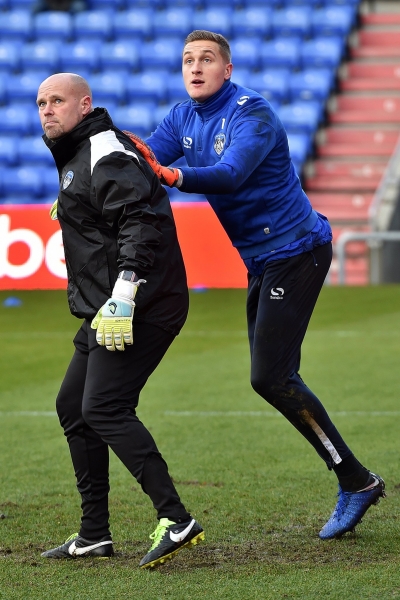My goalkeeping school, coaching grass roots goalkeepers has now been running for 12 years. Alongside that I have coached academy goalkeepers for 9 years and full time first team professional goalkeepers over League One, League Two and National League for 6 years. Prior to this I also coached in the non-league game.
Across this time, I have seen the demands of the game change in some ways for goalkeepers but at the same time I’m starting to worry if we are losing sight as coaches of what exactly we are preparing the goalkeepers for. I keep hearing phrases such as “The Modern Game” or “The Modern Keeper” and a huge emphasis seems to have now been placed on the goalkeeper’s ability to be good with their feet.
My fear now though is that perhaps the balance of importance has switched too far away from other aspects of their game and a focus needs to be placed on what or who exactly we are preparing them for. I’ll try and explain what I mean by this.
During my time at Swindon, in both my academy role and then overseeing every goalkeeper from under 9 to first team, the latter stages of my time there saw a defined philosophy at first team level especially, of “Playing out from the back”. When I say that term, some teams claim to be a passing team but often it’s in the opponent’s half, however at Swindon from 2014-2015 we played out from the back in an extreme manner!
Also, in recent years we have seen the likes of Man City firstly with Claudio Bravo and now particularly Ederson and at Liverpool with Alisson Becker it has become the fashion and demands that goalkeepers are good with their feet to play out.
Because of what was happening in the first team at Swindon at the time, that importance of playing out became more apparent at academy level as the players needed to be prepared for what possibly lay ahead. From a goalkeeping aspect I started to do more and more work in my sessions on the goalkeepers receiving and passing skills. I still however tried to ensure the goalkeepers put good emphasis on shot-stopping and keeping the ball out, so it was a balancing act.
When I moved to Forest Green Rovers with the former Swindon Manager the philosophy was again introduced that the team would play out from the back and try and dominate possession with a passing style of play. One of the existing goalkeepers at the club who was a fantastic shot-stopper found that style difficult to adapt to and at the same time Sam Russell was signed who was an experienced goalkeeper but also one who was very comfortable with the ball at his feet. Sam went on to play 54 games that season and we won promotion at Wembley to the football league.
The reason I mention these two periods is that, at these two clubs there was a strong passing/possession-based philosophy which meant the requirements from the goalkeepers at that time was such that they needed to be comfortable with the ball at their feet. They needed to have a good first touch, a range of passing, have good awareness and be brave with their decision making on their passing.
Since then I have moved on to Walsall in League One and Oldham Athletic in League Two. There are different ways to play the game and I mean no disrespect whatsoever to these two teams or the respective managers when I say the style of play differed to that of my time at Swindon and Forest Green Rovers. The risks taken at the back were/are less and therefore what was/is being asked of the goalkeepers in terms of distribution is also different. The number of back passes received is lower and the range of passing slightly longer.
To give you some ideas of the difference in numbers, below are the average amount of distributions per game with their feet each goalkeeper encountered during that time:
2014-15 – Wes Foderingham (Swindon) – 49
2015-16 – Lawrence Vigouroux (Swindon) – 34
2016-17 – Sam Russell (FGR) – 34
2017-18 – Brad Collins (FGR) – 37
2017-18 – Liam Roberts (Walsall) – 24
2018-19 – Daniel Iversen (Oldham) – 22
So, as you can see the demands placed on the goalkeepers in terms of the distribution with their feet at Walsall and Oldham was/is lower.
During my time at Swindon, I sent out three different young scholar goalkeepers on loan to a senior non-league team. It was to give them that experience of senior football and “toughen them up” and the two main differences they encountered from academy football to senior football was dealing with crosses (which I will come on to later in this blog) and distribution. From playing an academy style of football, a shorter range of passes and being brave to play out having more decisions of when and where to pass to, the requirements changed to hitting longer 60-70-yard goal kicks in particular.
In recent times I have watched a number of Under 23s games at academies and most teams try and play a passing style and use the goalkeeper as part of this. However, at the same time being involved in Leagues One, Two and the National League I think I can count on one hand the number of teams who do truly play out from the back using the goalkeeper as part of that.
In no way am I saying its not important for the goalkeepers to be good with the ball at their feet, its an area you do have to work on with the goalkeepers which I do. What I am saying is that perhaps as a club/team/academy you have to look at what demands are placed on your goalkeepers and tailor your programme to meet those rather than just “follow the latest fashion”.
This is where I come on to “dealing with crosses”. In recent years as I’ve just mentioned I’ve been involved with and seen academy games and been involved in Leagues One, Two and National League. I have also worked with young academy goalkeepers out of under 23 teams coming out on loan into senior first team football. All of them have said the same thing in that the big difference is dealing with crosses. They have spoken about the number of crosses they have faced and in particular the physical demands where they get challenged by big target men or centre backs trying to smash them! The process of getting them used to that and improving them in that aspect takes time, patience and support.
If you compare the number of distributions a goalkeeper completes with his feet against the number of crosses a goalkeeper comes for then yes distributions will be higher (on average the goalkeepers I mentioned earlier actually came for around 2-4 per game). However, a poor goal kick is perhaps less likely to be punished than a goalkeeper failing to deal sufficiently with a cross so its vital time is spent on this.
I’m also going to link in the matter of height while talking about crosses. The reason being that many coaches/managers will look at a smaller goalkeeper and fear that “he’s no good on crosses”
I don’t really like to use the term “a goalkeeper is too small” what I say to a goalkeeper who isn’t 6ft 2 / 6ft 3 + is that you cannot affect your height, you can’t make yourself grow but you have to show that your lack of height doesn’t hinder your ability to deal with crosses.
I worked with a 6ft 8 goalkeeper at one club, yet he didn’t come for many crosses. Whatever your height/size you have to be an effective goalkeeper!
Going back to my point about tailoring your programme I spoke just last week to the academy manager at Oldham. Although my main focus is currently on the first team goalkeeper’s I am interested in what is coming through the academy. Having seen the demands at first team level I asked about the coaching programme. I suggested that in the youth development phase upwards that some more emphasis be placed on the young goalkeeper’s ability to deal with crosses. That support needs to come from the coaching sessions but in particular support from all staff within the games programme. The goalkeepers should be encouraged to come and try and deal with crosses and if/when it goes wrong and they make a mistake, they need to be offered further encouragement and not too much criticism. In this way I hope that when they get to scholar level and possible professional contracts, whatever their size they have a positive mindset and good experiences in trying to deal with crosses to make the transition to senior football smoother.
To finish off though I still maintain that although you want to develop the goalkeepers in all aspects of the game and being good with your feet is important, dealing with crosses is important, one aspect outweighs all others.
KEEPING THE BALL OUT OF THE GOAL.
For me shot-stopping will always be the biggest priority in any programme.



